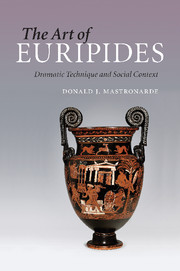Book contents
- Frontmatter
- Contents
- Preface
- Abbreviations and reference system
- 1 Approaching Euripides
- 2 Problems of genre
- 3 Dramatic structures: variety and unity
- 4 The chorus
- 5 The gods
- 6 Rhetoric and character
- 7 Women
- 8 Euripidean males and the limits of autonomy
- Conclusion
- Bibliography
- Index of names and topics
- Index of passages cited
4 - The chorus
Published online by Cambridge University Press: 04 May 2010
- Frontmatter
- Contents
- Preface
- Abbreviations and reference system
- 1 Approaching Euripides
- 2 Problems of genre
- 3 Dramatic structures: variety and unity
- 4 The chorus
- 5 The gods
- 6 Rhetoric and character
- 7 Women
- 8 Euripidean males and the limits of autonomy
- Conclusion
- Bibliography
- Index of names and topics
- Index of passages cited
Summary
In some fourth-century tragedies the choral parts had apparently become mere interludes dividing the “acts” (eventually the canonical “five acts”) in which the named characters performed their scenes without any interaction with a chorus, and such unrelated songs or embolima (as Aristotle termed them) had, so far as we know, no relation in content to the actors' scenes. Aristotle ascribed the origin of this practice to the poet Agathon, who was active from about 420 to 399. Embolima, according to the same evidence in the Poetics, were unknown in the plays of Sophocles and Euripides. Nevertheless, there is evidence in both authors for the gradual reduction of the importance of the chorus, indicated by the smaller proportion of their lines to the total length of the drama, their subordination to particular characters, and other features such as the expansion of actors' songs. Despite this trend, the chorus was still for them an essential part of the performance and of the generation of meaning, as it had been from the conjectured beginnings of the genre. Under the influence of a different remark by Aristotle and some comments in the scholia, Euripides' choral technique has usually been viewed as one aspect of decline from the “true” tragedy of Sophocles, and indeed as preparing the way for the embolimon by admitting a distinct looseness of connection and relevance in the content of his choral songs.
- Type
- Chapter
- Information
- The Art of EuripidesDramatic Technique and Social Context, pp. 88 - 152Publisher: Cambridge University PressPrint publication year: 2010



